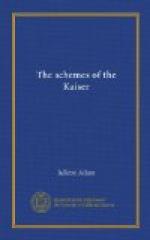William II is working hard to control and direct the diplomacy of the Triple Alliance. Nevertheless, all his scaffolding work is liable to sudden collapse, overthrown by the most insignificant of events. Regarding his speech to the recruits, the German Press has pluckily voiced its condemnation by the public. It is impossible to deny that his observations on that occasion were a perfect masterpiece of self-glorification. This is what he said—
“You have just taken the oath of fidelity to myself. From this day forward there exists for you one order and one order only, that of my majesty. Henceforth you have only one enemy, mine, and should it be necessary for me some day (which God forbid) to order you to shoot your own parents, yes, to fire on your own brothers and sisters, fathers and mothers, on that day remember your oath.”
Those who wish to form an accurate idea of William’s loquacity and self-conceit should read a few passages, selected haphazard from “The Voice of the Lord upon the waters,” a sermon by His Majesty, the Emperor-King, for use in polar voyages. There they will find a strange hotch-potch of all sorts of ideas, religious, political and heathen, all half digested. But the dominant note in the sermons preached by William II lies in his tendency to diminish the Infinite, to hold it within the measure of his own mind, to bring down God to his own stature. All his comparisons tend to show God as an Emperor, built in the image in which William sees himself. When he draws you a picture, in which he brings God face to face with himself, there is about him a certain splendour of pride, something in his utterance that suggests an Imperial Lucifer. But beyond these relations between God and the German Emperor, his utterances reveal nothing beyond commonplace self-conceit. In his perpetual and personal contact with the Divinity, William’s morality becomes more exacting than even that of God Himself towards His saints, who have long enjoyed His sanction to sin seven times a day. William II will not allow of a single sin. Everywhere and in everything he must interfere. Well may his subjects say, who have just received their catechism: “He is on heaven, on earth, and within us.”
January 1, 1892. [18]
I, who have so long been devoted to the Franco-Russian Alliance, have followed with acute distress the intrigues of Bismarck in Bulgaria (intrigues of which the Nouvelle Revue revealed one proof in the letters of Prince Ferdinand of Coburg to the Countess of Flanders). I have known that William, in spite of his actual dislike for the proceedings of his ex-Chancellor, is pleased to approve the impertinences of a Stamboulof. Nevertheless, I confess I am seized with anxiety at seeing France enter into diplomatic proceedings with the so-called Government of Bulgaria. It is very often more dignified to despise and ignore the enterprises of certain people, then to endeavour to obtain satisfaction from them. There are certain complicated circumstances in which the manifestation of a sense of honour or loyalty becomes a weakness: at all costs one should avoid being led into it.




